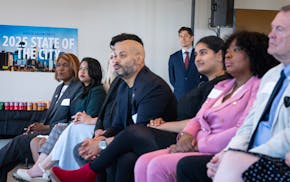Opinion editor's note: Editorials represent the opinions of the Star Tribune Editorial Board, which operates independently from the newsroom. This editorial updates and expands on one published Saturday evening following the shooting at a rally for Donald Trump.
•••
A day after the attempted assassination of former President Donald Trump at a campaign rally in Pennsylvania on Saturday, more facts are available.
It's been confirmed, for instance, that not only is Trump expected to fully recover from the injuries he received, he did not delay his departure to Milwaukee for the start of this week's Republican National Convention. Writing on his Truth Social site, the former president said that he would not allow a "potential assassin" to alter his schedule — a correct call and one in keeping with the constructive comments he has issued since the event.
Among those comments are sympathy expressed to two wounded at the rally, as well as condolences for the victim: Corey Comperatore, a 50-year-old former firefighter who died "a hero," according to Pennsylvania Gov. Josh Shapiro, for shielding his family from the shooting.
No one will similarly describe the alleged shooter, now identified as 20-year-old Thomas Matthew Crooks. But how to describe him remains elusive, which should promote caution in commenting on another profound unknown: his motive.
Crooks was registered as a Republican but donated $15 a few years back to a Democratic group. And his motive may not have even been political. Such was the case with John Hinckley, who shot then-President Ronald Reagan in 1981 hoping to impress an actress. Unfortunately, other examples exist, reflective of the violence that's long haunted American politics.
Not adding to the malevolence is the best method to cool down this already overheated political era. Or anytime, for that matter. Politicians themselves all too often offer incendiary comments that can be construed as a call for violence. Supporters, particularly those stewing in the toxicity of social media, often inflame the situation further. Some of this, on both sides, has already transpired within hours of the shooting. In fact, on Sunday the FBI deputy director said that threatening online rhetoric has been "ticking up" since the assassination attempt.
Few have the gift to express the sentiment correctly and constructively in the moment. Two who have done so — one on Saturday and another in a past time of turmoil, are worth noting.
Former Arizona Rep. Gabrielle Giffords, herself the victim of an attempted assassination, wrote on X in the wake of the shocking news that "Political violence is terrifying. I know. I'm holding former President Trump, and all those affected by today's indefensible act of violence in my heart. Political violence is un-American and is never acceptable — never."
And on the night of April 4, 1968, then-presidential candidate Robert F. Kennedy, the brother of an assassinated president and later slain himself, took to the social media of his time — the back of a flatbed truck — and gave a spontaneous speech in Indianapolis responding to the assassination of the Rev. Martin Luther King Jr.
It said, in part, "What we need in the United States is not division; what we need in the United States is not hatred; what we need in the United States is not violence and lawlessness; but love and wisdom, and compassion toward one another."
President Joe Biden aspired to express similar sentiments on Sunday. He said that the attempted assassination is "contrary to everything we stand for as a nation."
Biden's right. Just as Trump is correct in not allowing an assassination attempt to derail his departure to take part in the Republican convention. That's because regardless of the ultimate motive, the shooting was, in the words of FBI Director Christopher Wray on Sunday, "an attack on democracy and our democratic process."
It's essential to remember and respect that democracy and the democratic process not only allow for, but require, debate and dissent. And just as the former president and his supporters should not be silenced by an assassination attempt, neither should the current president nor his supporters. They should feel free to directly, respectfully respond to the rhetoric from the Rebublican convention and beyond, just as Republicans should commensurately comment on the Democratic convention message when delegates of that party gather in Chicago in August.
American democracy, wrote Abraham Lincoln, embodied "the one great living principle" of all representative government.
While this nation often fails to live up to that lofty description, it must always aspire to it, and thus must not allow an attempted assassin or reckless rhetoric to derail it.

Rash: At home, Jake Sullivan reflects on events abroad

Opinion: Let's not lose sight of what's best for older adults

Readers Write: Minneapolis politics, Trump's budget, hot tub rentals
